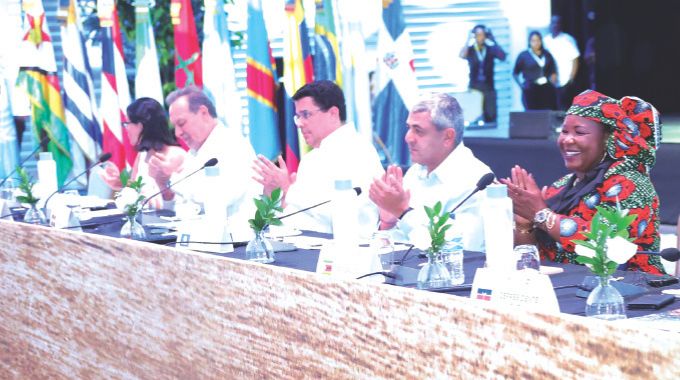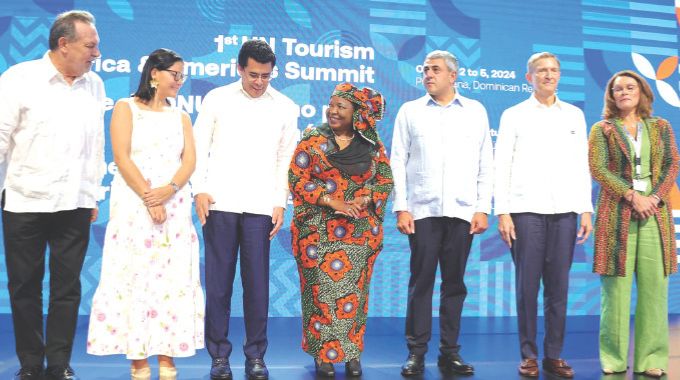Tendai Rupapa in PUNTA CANA, Dominican Republic
First Lady Dr Auxillia Mnangagwa, who is the country’s tourism patron, has enjoined Africa and the Americas to join forces and build a common agenda to maximise the potential of tourism beyond their regions by designing new products and cross-regional circuits.
Tourism, she said, has proven to be a cornerstone of economic activity with the potential to contribute to socio-economic development through employment creation.
Dr Mnangagwa made the remarks in her speech as guest of honour at the inaugural UN Tourism Africa & Americas Summit which attracted delegates from more than 27 countries in the Dominican Republic.
A video on the various activities being undertaken by the First Lady was shown at the summit, capturing the imagination of guests who expressed interest in following suit in their respective countries.
One of the key economic growth factors in the world, Dr Mnangagwa said, is tourism which has proven to be a cornerstone of economic activity.
“The potential to contribute to socio-economic development through employment creation in the tourism sector cannot be understated. It is therefore heartening to note that key tourism leaders and stakeholders from across Africa, Latin America, and the Caribbean are here to construct new avenues for South-to-South cooperation in the area of joint tourism development and promotion.
“By capitalising on the common cultures and traditions of Africa and the Americas, adopting joint tourism development efforts has high potential to empower and promote the tourism sector, and consequently, the socio-economic growth of both continents,” she said.

Dr Mnangagwa said her journey with regard to the adoption, development and promotion of gastronomy tourism in Zimbabwe had its genesis from the grassroots level where she engaged the chiefs’ wives to resuscitate the farming of traditional grains which were becoming extinct.
“I envisaged a holistic approach to gastronomy starting with the farming and preservation of our fruits, vegetables and grains.
“This gastronomy journey was consequentially driven by my passion to improve the livelihoods of women, youths and the community at large. After the planting process, I then proceeded to the second stage which is from the farm to the table. In 2019, I came up with a gastronomy tourism concept focusing on nationwide cookout competitions.
“This endeavour primarily focuses on village home cooks aiming to preserve Zimbabwe’s heritage while also empowering communities. Celebrating indigenous cuisine, the cooking competition serves as a platform for home cooks to showcase their culinary skills and share unique recipes.
“The menu was incredibly vast and there were so many dishes exhibited that we didn’t know from the various ethnic groups that make up Zimbabwe,” she said.
Her initiative, Dr Mnangagwa said, was helping to preserve a vital aspect of Zimbabwe’s cultural identity.
These diverse flavours of the country, she said, also foster a sense of pride and belonging.
“I am helping to create opportunities for economic growth and empowerment of women and families. It is important to highlight that today, Zimbabwe continues with the journey of raising awareness on the significance of our traditional foods with proven medicinal properties and how they are important as immune boosters to our human body systems.
“In 2022, I requested the Ministry of Tourism and Hospitality Industry to coordinate the implementation of the cookout programme, together with other line ministries and provincial structures. It started as a small event but then it grew to a national level. In 2023, the programme was further elevated to the SADC regional gastronomy competitions.
“This inaugural event was successfully held at the Great Zimbabwe national monuments, with SADC countries and those outside SADC taking part.
The SADC regional event attracted the international community, resulting in an invitation being extended to me by the UN Tourism to the global forum on gastronomy tourism in San Sebastian Spain in October 2023. At this forum, the Zimbabwean experience in promoting traditional cuisine was shared with other countries from all over the world,” she said.
In line with the women empowerment trope, she advocated and launched the Agric4she programme, aimed at empowering women with inputs for commercial farming of traditional grains promoting them from subsistence to commercial farming.
“Additionally, I launched the farm-to-market programme in May 2024, a concept that promotes economic movement along the food value chain from agronomy to the market and finally to the consumer at the table. This completed the value chain from planting to cooking and a market for traditional foods.
“Through this experience, I saw that gastronomy tourism will uplift community livelihoods, and open income doors for communities to be part of the market value chain. The key success factors of gastronomy tourism are in the linkages across sectors that create seamless value chains in the processes.
“Your excellencies, distinguished guests, I am pleased to report that, as a result of all the above-mentioned efforts, the Un Tourism hosted the inaugural UN Tourism Africa Regional Gastronomy Forum in Zimbabwe in July 2024, which I endorsed in my capacity of national tourism patron and First Lady of the Republic of Zimbabwe. Additionally, UN Tourism is helping in building a UN Tourism academy for culinary arts for the African continent in Zimbabwe, Victoria Falls resort town. This platform also recognised the importance of empowering youth and the generations to come as change-makers and leaders of the future of the tourism industry, through the establishment of the Africa International Academy for Culinary Arts in collaboration with un tourism.
Dr Mnangagwa said the results achieved by tourism sectors were notable. Africa and the Americas have not only restored the pre-pandemic levels, but they have even gone beyond and increased these numbers by attracting an increasing demography of international tourists as witnessed by the latest data displayed by UN Tourism.
“It is critically important for Africa and the Americas to join forces and build a common agenda to maximize the potential of tourism beyond our regions by designing new tourism products and cross-regional circuits. I believe that UN Tourism is hereby providing us with a unique platform to unlock new synergies, and exchange experiences and best practices. I believe that this is just the starting point of a long-term collaboration between our two regions which will continue.
“May I conclude by proposing that we are welcoming you all to Africa for the next edition of this meeting! May I also take this opportunity to propose that we hold an Africa-Americas and Caribbean Gastronomy Forum which we can gladly host in Africa, and maybe Zimbabwe in particular, if it is collectively agreed to,” she said.
Speaking at the same occasion, the Dominican Republic Vice President Dr Raquel Peña said the summit programme was a clear sign of the determination of the UN to continue promoting the tourism industry which experienced a major setback during COVID-19.
“Thanks to international collaborations for concrete actions to manage tourism in an efficient manner. This joint effort allows us to strengthen the tourism sector. Tourism is one of our main priorities and we are focusing on diversifying new tourism modalities like health tourism.
“Tourism generates economic growth and is a key tool in fighting climate change and preserving our ecosystems. We ensure our future generations will be able to enjoy the resources in Africa and America. Let’s continue fostering our collaboration as Africa and Americas, our success depends on our ability to work together. Let’s build bridges as brothers and sisters. Tourism is a catalyst for peace and is filled with opportunities for our people. Let’s continue collaborating and implement best practices of tourism to ensure economic growth and protect the beauty of both Africa and the Americas. The future begins today with all of us,” she said.
In his remarks, UN Tourism Secretary-General, Mr Zurab Pololikashvili, paid glowing tribute to Dr Mnangagwa for her efforts to boost tourism development as well as women empowerment.
“We are here and I think it’s a great and historic day. I want to give special thanks to the First Lady of Zimbabwe Her Excellency Dr Auxillia Mnangagwa. I had an honour to visit another great event in Victoria Falls two months ago. We had to know what the First Lady is doing for the tourism industry in the continent and I was surprised thanks to her. She puts effort that gives gastronomy top priority. Her service is really appreciated and how she is supporting women’s empowerment in the continent and everywhere. Again, it’s an honour to have Her Excellency with us, it’s a great support to our event because it’s not easy to have such representatives of high magnitude here. I really appreciate your presence and I am sure this is the beginning of another great tourism story,” he said
Mr Pololikashvili said Africa and the Americas were diverse and complementary at the same time.
Both, he said, were blessed with natural wonders and rich cultural heritage.
“They share common roots and historical ties. And their futures are also closely linked. Especially in the field of tourism. In 2023, African and American destinations recorded 267 million international tourist arrivals between them. And these numbers are expected to grow. Our latest World Tourism Barometer underscores the remarkable results achieved by both regions, which have fully recovered and even exceeded pre-pandemic levels. With this in mind, this summit offers a unique platform to: forge connections and build bridges between Africa and the Americas, create strategic cross-regional partnerships, foster South-South cooperation projects for the benefit of the tourism sector of the two regions,” he said.
Mr Pololikashvili said Africa and the Americas were on the pedestal to begin a collaborative journey.
UN Tourism, Mr Pololikashvili said, was fully committed to the creation of an environment which facilitates tourism investment flows and strengthens interregional economic relations.
UN tourism chair of the Regional Commission for Africa Mr Steven Obeegadoo described the holding of the summit as critical in building tourism resilience in the wake of global uncertainties triggered by climate change and geopolitical factors.
“The holding of this first meeting marks an important milestone in the promotion of South-South cooperation, investment, education, culture, creative industries and innovation for both our regions. Ladies and gentlemen, the international tourism landscape has witnessed a paradigm shift in the post-COVID-19 era where countries have begun to reinforce efforts to be resilient to promote sustainability and inclusiveness and sustain jobs to ensure the survival of the sector,” he said.
The “Punta Cana Declaration” was adopted at the meeting after days of shared dialogue around the key themes of education and investments in the sector.
Recognising the historic ties between the two regions, as well as their unique and complementary cultures, the summit served as a landmark platform for strengthened cooperation, capitalizing on innovation, education, investments and creative industries for the future development of tourism. – Herald

